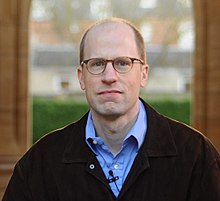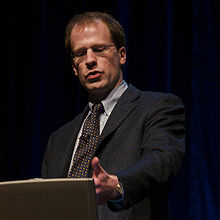Nick Bostrom
philosopher and writer (born 1973)
Nick Bostrom (born 10 March 1973) is a Swedish philosopher at the University of Oxford known for his work on anthropic bias, the ethics of human enhancement, superintelligence, and existential risk.


Quotes
edit- [If] our actions have even the slightest effect on the probability of eventual colonization, this will outweigh their effect on when colonization takes place. For standard utilitarians, priority number one, two, three and four should consequently be to reduce existential risk. The utilitarian imperative “Maximize expected aggregate utility!” can be simplified to the maxim “Minimize existential risk!”
- Many humans look at nature from an aesthetic perspective and think in terms of biodiversity and the health of ecosystems, but forget that the animals that inhabit these ecosystems are individuals and have their own needs. Disease, starvation, predation, ostracism, and sexual frustration are endemic in so-called healthy ecosystems. The great taboo in the animal rights movement is that most suffering is due to natural causes. Any proposal for remedying this situation is bound to sound utopian, but my dream is that one day the sun will rise on Earth and all sentient creatures will greet the new day with joy.
- Albert, a fictional dog in Golden (2004)
- Had Mother Nature been a real parent, she would have been in jail for child abuse and murder.
- In Defence of Posthuman Dignity, Bioethics, Vol. 19, Iss. 3 (2005), p. 211
- The singleton hypothesis is that Earth-originating intelligent life will (eventually) form a singleton. It is an open question whether the singleton hypothesis is true. My own opinion is that it is more likely true than not. Historically, we have seen an overarching trend towards the emergence of higher levels of social organization, from hunter-gatherer bands, to chiefdoms, city-states, nation states, and now multinational organizations, regional alliances, various international governance structures, and other aspects of globalization. Extrapolation of this trend points to the creation of a singleton.
- What is a Singleton? (2005)
- Searching for a cure for aging is not just a nice thing that we should perhaps one day get around to. It is an urgent, screaming moral imperative. The sooner we start a focused research program, the sooner we will get results. It matters if we get the cure in 25 years rather than in 24 years: a population greater than that of Canada would die as a result. In this matter, time equals life, at a rate of approximately 70 lives per minute. With the meter ticking at such a furious rate, we should stop faffing about.
- By anybody’s standards, there is a huge amount of unnecessary and undeserved suffering that is just bad and that we should get rid of.
- as quoted in "The End of Suffering" (2006), Philosophy Now, Issue 56
- The Internet is a big boon to academic research. Gone are the days spent in dusty library stacks digging for journal articles. Many articles are available free to the public in open-access journal or as preprints on the authors’ website.
- The universe is cold. Fun is the fire that melts the blocks of hardship and creates a bubbling celebration of life. It is the birth right of every creature, a right no less sacred for having been trampled on since the beginning of time.
- Letter From Utopia (2008)
- What could be more fascinating than discovering life that had evolved entirely independently of life here on Earth? Many people would also find it heartening to learn that we are not entirely alone in this vast cold cosmos. But I hope that our Mars probes will discover nothing. It would be good news if we find Mars to be completely sterile. Dead rocks and lifeless sands would lift my spirit.
- Aggregative consequentialist theories are threatened by infinitarian paralysis: they seem to imply that if the world is canonically infinite then it is always ethically indifferent what we do. In particular, they would imply that it is ethically indifferent whether we cause another holocaust or prevent one from occurring. If any non-contradictory normative implication is a reductio ad absurdum, this one is.
- Infinite Ethics (2011)
- It is possible that efforts to contemplate some risk area—say, existential risk—will do more harm than good. One might suppose that thinking about a topic should be entirely harmless, but this is not necessarily so. If one gets a good idea, one will be tempted to share it; and in so doing one might create an information hazard. Still, one likes to believe that, on balance, investigations into existential risks and most other risk areas will tend to reduce rather than increase the risks of their subject matter.
- Since we cannot completely eliminate existential risk — at any moment, we might be tossed into the dustbin of cosmic history by the advancing front of a vacuum phase transition triggered in some remote galaxy a billion years ago — the use of maximin in the present context would entail choosing the action that has the greatest benefit under the assumption of impending extinction. Maximin thus implies that we ought all to start partying as if there were no tomorrow. That implication, while perhaps tempting, is implausible.
- In this book, I try to understand the challenge presented by the prospect of superintelligence, and how we might best respond. This is quite possibly the most important and most daunting challenge humanity has ever faced. And—whether we succeed or fail—it is probably the last challenge we will ever face.
- Preface
- Observers in earlier epochs might have found it equally preposterous to suppose that the world economy would one day be doubling several times within a single lifespan. Yet that is the extraordinary condition we now take to be ordinary.
- Ch. 1
- Far from being the smartest possible biological species, we are probably better thought of as the stupidest possible biological species capable of starting a technological civilization - a niche we filled because we got there first, not because we are in any sense optimally adapted to it.
- Ch. 2
- The cognitive functioning of a human brain depends on a delicate orchestration of many factors, especially during the critical stages of embryo development—and it is much more likely that this self-organizing structure, to be enhanced, needs to be carefully balanced, tuned, and cultivated rather than simply flooded with some extraneous potion.
- Ch. 2
- The gap between a dumb and a clever person may appear large from an anthropocentric perspective, yet in a less parochial view the two have nearly indistinguishable minds.
- Ch. 4
- Perhaps it is a sign of civilizational progress that the very idea of threatening a nuclear first strike today seems borderline silly or morally obscene.
- Ch. 5
- [A]ssuming that the observable universe is void of extraterrestrial civilizations, then what hangs in the balance is at least 10,000,000,000,000,000,000,000,000,000,000,000,000,000,000,000,000,000,000,000 human lives (though the true number is probably larger). If we represent all the happiness experienced during one entire such life with a single teardrop of joy, then the happiness of these souls could fill and refill the Earth’s oceans every second, and keep doing so for a hundred billion billion millennia. It is really important that we make sure these truly are tears of joy.
- Ch. 6
- Our demise may instead result from the habitat destruction that ensues when the AI begins massive global construction projects using nanotech factories and assemblers—construction projects which quickly, perhaps within days or weeks, tile all of the Earth’s surface with solar panels, nuclear reactors, supercomputing facilities with protruding cooling towers, space rocket launchers, or other installations whereby the AI intends to maximize the long-term cumulative realization of its values. Human brains, if they contain information relevant to the AI’s goals, could be disassembled and scanned, and the extracted data transferred to some more efficient and secure storage format.
- Ch. 6
- Nature might be a great experimentalist, but one who would never pass muster with an ethics review board – contravening the Helsinki Declaration and every norm of moral decency, left, right, and center.
- Ch. 12
- Solving the value-loading problem is a research challenge worthy of some of the next generation’s best mathematical talent. We cannot postpone confronting this problem until the AI has developed enough reason to easily understand our intentions.
- Ch. 12
- Even a single missed crucial consideration could vitiate our most valiant efforts or render them as actively harmful as those of a soldier who is fighting on the wrong side. The search for crucial considerations (which must explore normative as well as descriptive issues) will often require crisscrossing the boundaries between different academic disciplines and other fields of knowledge. As there is no established methodology for how to go about this kind of research, difficult original thinking is necessary.
- Ch. 15
- Before the prospect of an intelligence explosion, we humans are like small children playing with a bomb. Such is the mismatch between the power of our plaything and the immaturity of our conduct. Superintelligence is a challenge for which we are not ready now and will not be ready for a long time. We have little idea when the detonation will occur, though if we hold the device to our ear we can hear a faint ticking sound.
- Ch. 15
- In this situation, any feeling of gee-wiz exhilaration would be out of place. Consternation and fear would be closer to the mark; but the most appropriate attitude may be a bitter determination to be as competent as we can, much as if we were preparing for a difficult exam that will either realize our dreams or obliterate them.
- Ch. 15
External links
edit- Nick Bostrom's homepage.
- Bostrom's Anthropic Principle Primer containing information about the anthropic principle and the Doomsday argument.
- Bostrom's Simulation Argument
- Oxford Future of Humanity Institute
- The Guardian interviews Bostrom about the World Transhumanist Association
- Interview on transhumanism